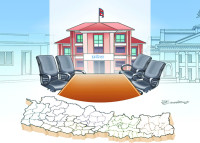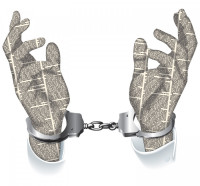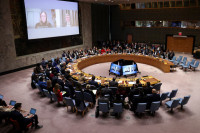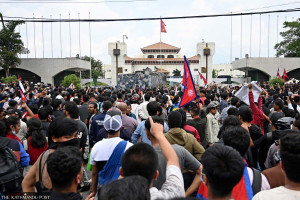Opinion
The powers that be
If Nepal does not focus on generating hydroelectricity for energy security even after the ongoing fuel crisis, it never will
Navin Singh Khadka
All these years, Nepali leaders across political parties have been arguing that there can be no development works without first completing the political process. If the ongoing blockade at the border is troubling them at all, they must have begun to realise how wrong they were. Countries across the globe require development works to go hand in hand with the political processes; what happens if they do not is something Nepal has the latest on offer.
This article, however, is neither a commentary on the ongoing Tarai protests nor a suggestion that Kathmandu could leverage energy security to ignore the demands of the protesters. The earthquake-disrupted trading routes between Nepal and China are equally good examples of what happens when a nation becomes dependent. These ground realities belie the values of globalisation.
Bhutan’s ambitions
Meanwhile, another country in the region has demonstrated how a state can take the initiative to reduce dependency and earn international accolades at the same time. Bhutan is aiming to become a world leader in the use of electric vehicles. It has been a year since the Dragon kingdom announced the ambitious goal and about 50 electric vehicles are already plying on its roads. Nearly two dozen more have been ordered.
“Electricity is like oil for us and is the most abundant resource,” Bhutanese Prime Minister Tshering Tobgay told the Reuters. “My target for Bhutan is a 70 percent reduction in fossil fuel imports by 2020.”
Tall talks? It might have sounded so even when Bhutan talked about exporting hydropower to India and becoming rich. Over the years, it has done what it said and has now raised its game much higher: aspiring to be a world leader in using electric vehicles.
Thimpu did all of this while Nepali leaders just kept selling the dream that the country would become rich by exporting power to India. In reality, the country is actually importing power from its southern neighbour and the load shedding would worsen if it were to not do so.
Politics and development
The fundamental flaw on the part of Nepal has been to see hydropower only as an export product. Water experts have long argued that the electricity which can be produced from the country’s massive water resources should first be recognised as a raw material to fuel the country’s economy. This would not just include supplying electricity to households and manufacturing industries but also powering the transport industry, agricultural cultivation, and almost every economic and productive activity.
There have been some gimmicks to that end ranging from listing national pride projects to establishing an autonomous body to fast track infrastructure projects, including hydropower plants. Agreements have been signed with foreign companies for the development of lucrative projects like Upper Karnali, Arun III and West Seti. But there has barely been any follow-up to these deals and their updates remain elusive.
Behind all this instances of non-performances are a combination of factors. But the leading cause has been the school of thought that development works can wait until politics is sorted out. Several international development workers have shared with this scribe that all recent Nepali prime ministers told them that development works were simply not their priority at the moment. In an interview I did for the BBC few years ago, a noted development expert and geographer Pitamber Sharma said that he resigned as vice-chairman of the National Planning Commission because the politicians who appointed him simply did not have development on their agenda.
Take one recent example. Amid all that fanfare with slogans like ‘build back better’ the government announced the post-quake reconstruction programme and the donors have already pledged four billion dollars in foreign aid. Yet, even after being shaken by so many aftershocks, the country is yet to bring the Reconstruction Authority into action.
The argument by politicians, once again, is that they were caught up in writing and promulgating the constitution. Now that both the tasks have been completed, has reconstruction received any attention? The answer is a big no.
History has shown that every political turning point for Nepal has marked the beginning of another phase of uncertainty. And that has held development works hostage throughout.Furthermore, as in the past, even as the ‘ultimate’ political process—has ‘ended’ it has already given way to another uneasy episode of politics.
Note to self
If there is any lesson is to be learnt from this episode, it is that hydropower development should be the topmost priority now. Once that is achieved, most of the other dependencies will just go away. Turning towards the northern neighbour, as some people to be suggesting, will not provide a long-term solution—although it would be good to have multiple trade routes.
Despite much hope that supplies-laden lorries will descend from China into Nepal via the Rasuwagadi and Tatopani customs points, China Southern Airline has become the first international airline to suspend its flight to Kathmandu citing lack of refuelling facility at the Tribhuvan International Airport in the wake of unofficial blockade by India. Even if China may be willing to help all out with the supplies Nepal needs, one should not forget that the trucks and lorries will have to come through Tibet, an extremely sensitive area for Beijing and the place the western world has its eyes well set on. Any small incident there, and the entire area gets closed.
After the April earthquake, climbers have already come back to the Nepali side of the Everest while China has yet to reopen the north climbing route. The lofty talks of becoming a bridge between the world’s two fastest emerging economies—China and India—can, therefore, continue. But what the country needs to do on war footing now is to plug itself to the hydropower resource it already has. Only such self-dependence can shield the country from the kind of shock and pain it is currently facing.
Khadka is a BBC journalist based in London




 10.45°C Kathmandu
10.45°C Kathmandu












